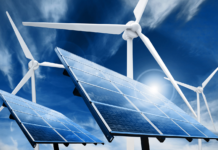
The North Face is inviting scorn and maybe a little coal into their petroleum-based stockings this Christmas.
Why does a performance nylon apparel brand want to cut off their nose to spite their face? The North Face, a high-end outdoor brand, made the latest move in the never-ending quest to virtue signal: They denied an oil and gas company the holiday gifts executives hoped to purchase for their customers. This is strange given that their products are made from materials such as nylon, polyester and acrylic, all of which are derived from petroleum.
The North Face should celebrate the men and women who work in the oil and gas industry for making their business possible, not disparage them. We must end these bizarre and insincere efforts to boycott, divest and sanction the companies that are meeting the world’s needs with abundant, reliable and affordable energy.
Here’s what happened: This past week, The North Face informed Houston-based Innovex Downhole Solutions that their order of personalized jackets did not meet the brand’s image standards. The North Face actually equates the industry with other types of businesses it doesn’t want to touch with a 1,000-foot pole: porn, tobacco and alcohol.
In an open letter posted to LinkedIn, Innovex CEO Adam Anderson noted the hypocrisy. He asked Steve Rendle, the CEO of The North Face parent company VF Corporation, to reconsider his stance, writing, “We should be celebrating the benefits of what oil and gas do to enable the outdoors lifestyle your brands embrace. Without Oil and Gas, there would be no market for nor ability to create the products your company sells.”
It is true the list of available customers and suppliers for The North Face narrows considerably — in fact to zero — if their stance is applied to their own business. Kudos to Anderson for striving for education on the benefits oil and gas provide to human life and development. The industry provides the advances in material science and fuels that make getting outside in the elements possible, enabling more people to appreciate the bounty of the outdoors — without wearing sealskin and mink fur.
It is not just high-end camping equipment that wants to shut down oil and gas. Institutional investors from BlackRock to the Bank of the West have made big pronouncements about no longer investing in oil and gas, despite ignoring the growing reality of a planet that is desperate for reliable, affordable energy to move countries out of poverty. In practice, these policies are rarely enforced in their entirety because these institutions and their consumers recognize petroleum products are critical to modern life.
Annually, oil and gas producers pay billions in taxes to fund state and local governments, which in turn pay their employees, make deposits and hire these same finance organizations who demonize those who provide the money coming into their portfolios. Like The North Face, these institutions are actively encouraging their customers to look elsewhere despite the overwhelming evidence that their statements taken to full effect would be a disaster.
This year, the world health community has used petroleum to control COVID-19, providing the building blocks to mass-produce personal protective equipment, medical devices and the necessary temperatures needed to store and transport the vaccines being shipped worldwide. Without oil and gas resources, the costs and timeline to fight and recover from this virus would have tracked with the initial projections of a multi-year fight with untold millions of dead.
The oil and gas industry embraces competition with renewable energy sources. More transparency and reporting and informed emission reduction targets are good things. Men and women in this industry are proud of their record of environmental stewardship, and, more importantly to the world, they are not complacent with simply making platitudes and resting on the progress made.
Virtue signaling does not make anyone’s life better, but it does undermine the facts. Some corporate entities just want to demonize the good.
About the author: Jason Modglin is President of the Texas Alliance of Energy Producers and an avid camper.














